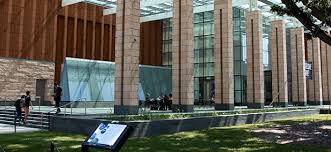
Pursuing an MBA at the University of Michigan is a significant investment in your future. To make this prestigious program more accessible, the university offers a variety of financial aid options, including scholarships, loans, and grants.

This article provides a detailed guide on how to apply for financial aid for the Michigan MBA program, covering the types of aid available, eligibility criteria, application process, and essential tips for applicants.
Overview of the Michigan MBA Program
History and Prestige
The University of Michigan’s MBA program is renowned for its rigorous curriculum and emphasis on leadership and innovation. With a history dating back over a century, it consistently ranks among the top MBA programs in the world.
Program Highlights
The Michigan MBA program offers a diverse curriculum, experiential learning opportunities, and a strong alumni network. Students can choose from various specializations and participate in hands-on projects, global experiences, and leadership development initiatives.
Notable Alumni and Achievements
Alumni from the University of Michigan’s MBA program are influential leaders in numerous industries, contributing to the school’s reputation for producing highly skilled and successful business professionals.
Types of Financial Aid Available
Scholarships
Scholarships are awarded based on merit, need, or specific criteria such as leadership potential or commitment to diversity. These awards do not need to be repaid and can significantly reduce the cost of tuition.
Loans
Loans are available to both domestic and international students to help cover tuition and living expenses. Federal loans, private loans, and institutional loans each have different terms and conditions.
Grants
Grants are typically need-based and do not need to be repaid. They are awarded based on the student’s financial situation and can help cover a portion of the tuition and fees.
Assistantships
Graduate assistantships offer students the opportunity to work part-time in research or teaching roles in exchange for a stipend and tuition waiver. These positions provide valuable experience and financial support.
Eligibility Criteria
General Eligibility Requirements
To be eligible for financial aid, applicants must be admitted to the Michigan MBA program and demonstrate financial need or meet specific merit-based criteria.
Specific Criteria for Different Aid Types
- Scholarships: High academic achievement, leadership potential, and extracurricular involvement.
- Loans: Enrollment in the MBA program and meeting creditworthiness criteria.
- Grants: Demonstrated financial need based on income and assets.
- Assistantships: Relevant skills and experience, as well as academic performance.
Application Process
Steps to Apply for Financial Aid
- Research: Begin by researching the different types of financial aid available on the University of Michigan Financial Aid page.
- Prepare Documentation: Gather necessary documents, including tax returns, financial statements, and academic records.
- Submit the FAFSA: Domestic students should complete the Free Application for Federal Student Aid (FAFSA) to be considered for federal loans and grants. Use the University of Michigan’s school code: 002325.
- Complete Institutional Applications: Some aid types require additional applications specific to the University of Michigan.
- Apply for Scholarships: Submit applications for merit-based and need-based scholarships through the university’s portal.
- Seek Assistantships: Apply for graduate assistantships through the university’s employment portal.
Required Documentation
- FAFSA: For U.S. citizens and eligible non-citizens.
- CSS Profile: Some scholarships and grants may require the CSS Profile.
- Tax Returns and Financial Statements: Proof of income and financial need.
- Academic Records: Transcripts and test scores.
Deadlines and Timelines
Financial aid deadlines vary by type and source. It is crucial to check the specific deadlines on the University of Michigan Financial Aid page. Generally, the FAFSA should be submitted as soon as possible after October 1st.
Tips for a Successful Application
Completing the FAFSA
- Start Early: The FAFSA opens on October 1st each year. Submit early to maximize aid eligibility.
- Accurate Information: Ensure all information is accurate and complete to avoid delays.
- Follow Up: Check the status of your application and respond promptly to any requests for additional information.
Applying for Scholarships
- Tailor Applications: Customize each scholarship application to highlight relevant achievements and experiences.
- Strong Essays: Write compelling essays that reflect your goals and qualifications.
- Recommendation Letters: Obtain strong letters of recommendation from mentors or professors who can speak to your abilities.
Securing Assistantships
- Relevant Skills: Highlight relevant skills and experiences in your application.
- Network: Reach out to faculty members and current assistants to learn about available positions.
- Apply Early: Assistantship positions can be competitive, so apply as soon as they become available.
Frequently Asked Questions (FAQ)
What types of financial aid are available for the Michigan MBA program?
The University of Michigan offers scholarships, loans, grants, and assistantships to help MBA students finance their education.
How do I know if I am eligible for financial aid?
Eligibility varies by aid type. General requirements include being admitted to the MBA program and demonstrating financial need or merit.
What documents do I need to apply for financial aid?
Common documents include the FAFSA, CSS Profile, tax returns, financial statements, and academic records.
When should I apply for financial aid?
Apply as early as possible. The FAFSA opens on October 1st, and specific deadlines for other aid types can be found on the University of Michigan Financial Aid page.
Can international students apply for financial aid?
Yes, international students can apply for certain types of aid, including scholarships and private loans. Check specific eligibility requirements.
How can I improve my chances of receiving financial aid?
Submit all applications early, provide accurate information, and ensure your scholarship and assistantship applications are well-prepared and tailored to the criteria.
Additional Resources
- University of Michigan Financial Aid
- Free Application for Federal Student Aid (FAFSA)
- CSS Profile
- Michigan MBA Program Information
Conclusion
Applying for financial aid at the University of Michigan can significantly reduce the financial burden of pursuing an MBA. By understanding the types of aid available, meeting the eligibility criteria, and following a thorough application process, you can enhance your chances of securing financial support.
Start early, be meticulous, and leverage all available resources to make your MBA journey financially feasible. Remember, financial aid not only helps you manage costs but also recognizes your potential and achievements. Don’t hesitate to apply and take advantage of these valuable opportunities.






